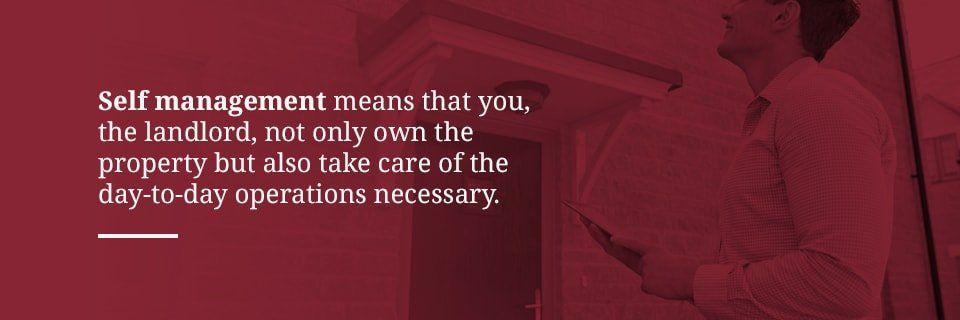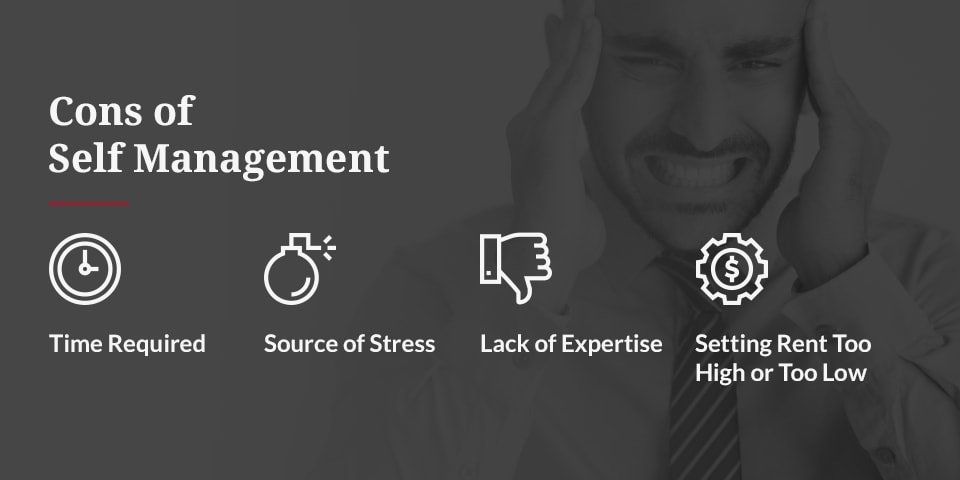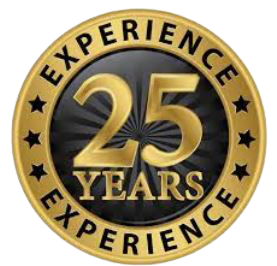Rental properties can be an excellent investment opportunity. If you already invested in rental property or you plan to purchase a property and begin your journey as a landlord, you may wonder what comes next. Once your property is ready to go, it's time to figure out all the nuts and bolts of how to manage your property.
There are two main options to consider for managing your rental property — managing your own property vs. hiring a property manager. Choosing one of these options determines how the daily operations of your rental properties are run. What do these daily operations include? Let's take a look at the tasks managing a rental property entails:
- Advertising your property
- Determining rental rates
- Preparing the lease
- Tenant screening
- Collecting rent
- Doing preventative maintenance
- Making repairs as needed
- Fielding complaints
- Moderating issues between tenants
- Checking in with tenants at least once a quarter
- Enforcing the lease
- Evicting a tenant when necessary
- Finding new tenants when vacancies occur
With a list that long, deciding who will take care of these responsibilities is an important decision. Self management may save you money, but property management will save you time and effort, ensuring things get taken care of quickly and professionally. Let's look at each of these property management options in greater detail so you can make an informed decision.
What Is Self Management?
Self management means that you, the landlord, not only own the property but also take care of the day-to-day operations necessary to make things go smoothly and keep the property up to date. Your tenants will look to you alone as their point person for routine things like paying rent and for addressing issues that come up.
There are a few potential advantages to self management if you have the time and expertise necessary to do it well, but there are many disadvantages, too. Let's take a look at the pros and cons of self management.
Pros of Self ManagementThere are some advantages to managing your property yourself, including:
- Greater Control:Self management gives you a greater degree of control over daily operations. You'll be the one making all necessary decisions. If you have trouble delegating, then you may feel more comfortable being in control of every detail of how your properties are run.
- Closer Relationships With Tenants: You can also expect closer relationship with tenants since you will be their point of contact. Of course, landlord-tenant relationships can turn sour at times, so in these cases, you may wish you didn't have to be the one to handle issues with tenants.
- Gained Experience: You will also learn a lot about property management by doing it yourself, which some landlords may consider an advantage if they want to eventually focus more on management in their real estate career than on ownership. Expect to experience some hiccups along the way, though.
- Financial Savings: One other advantage that is the determining factor in some property owners' decision to self manage is that it can save you money. Typically, if you have a property management company, about eight to 10 percent of your rental income goes to pay for their services.
 While there are some advantages to self management, there also are a number of disadvantages, as well. These include:
While there are some advantages to self management, there also are a number of disadvantages, as well. These include:- Time Required: If that list of responsibilities provided above looks long, that's because it is. And that is just for just one property. If you have multiple properties, then your duties will multiply. The time it takes to take care of all these responsibilities can be significant, and it could certainly keep you from pursuing other business ventures.
- Source of Stress: You may also cause yourself a lot of stress by taking on some of these responsibilities. If a tenant has a burst pipe at 2 a.m., you'll be the one taking that call and figuring out how to get it taken care of as soon as possible. If a tenant is not complying with a policy, you'll be the one confronting them with the policies agreed upon in their lease and taking any necessary follow-up actions, including eviction.
- Lack of Expertise: Another issue is that, if you're just starting out as a landlord, you are sure to encounter issues that have to do with legal regulations or best practices that you are simply unaware of. It can take a long time to gain the experience and expertise necessary to manage a property well without running into problems.
- Setting Rent Too High or Too Low: If you do not enlist the assistance of a professional, you may find you have not set the rent at the right level for your area, which means you will either miss out on potential income or miss out on renters. A property management service knows local rent levels for other places nearby and can aid you in finding the right figure to charge based on your location and amenities.

Property management means someone else runs a property you own for you, handling the day-to-day tasks big and small that keep your investment prospering. If you go the property management route, you pass on that long list of duties above for another party to handle. You don't necessarily have to leave yourself out of the equation entirely if you want to have some control over decisions, but for the most part, you can step back and let the property management group you partner with handle everything from advertising a property to collecting rent to handling any issues that come up.
There are some potential advantages and disadvantages to choosing to use a property management group rather than self manage your property. Let's look at the pros and cons of property managers.
Pros of Property Management There are some important reasons to choose property management over self management, including:
There are some important reasons to choose property management over self management, including:
- More Time: Probably the biggest advantage of using a property manager is that it will save you time — in some cases, a great deal of time. Remember that long list of responsibilities? They're now off your shoulders. Any time you don't have to spend on managing a property can be spent on other pursuits, like searching for other properties you want to invest in or seeking out other business opportunities.
- Separation of Work and Personal Life: It's not just that you save time but also that you can more effectively separate your work from your personal life. Knowing you won't have to answer a phone call and head out to a property during the weekend means you can spend time doing what you enjoy or being with your family or friends. It also means you can travel without worrying about being gone.
- The Property Manager's Experience: A big advantage you gain with a property manager is all their valuable knowledge gained over years of managing properties. Property management groups typically have a lot of experience dealing with the issues you would have to learn on the fly. Where you may experience a real headache trying to deal with a problem, your property manager will likely know the best way to handle it based on past experience.
- The Property Manager's Expertise: When it comes to rules, regulations and best practices you need to be aware of, relying on a property manager can be extremely helpful. Property managers are committed to understanding the ins and outs of the rental industry, including rental law and how to avoid violating Fair Housing laws and any state statutes you must abide by.
- Ease of Filling Vacancies: Property management companies have screening processes they rely on to find the best tenants. You may not know how to conduct such inquiries or be uncertain how to gauge a prospective renter.
There are a few potential cons to hiring a property management that you should also consider, including:
- Less Personal Experience: Depending on your career goals, distancing yourself from the daily operations and even issues associated with your rentals could be a disadvantage rather than an advantage. If you want to eventually become a property manager yourself, then you'll want to gain as much experience as you can with property management, and, of course, handing off your responsibilities to a property manager will inhibit that.
- Property Managers Who Disappoint: Other disadvantages can come in if you hire a property manager who fails to deliver on the advantages you expect from them. The advantages associated with hiring a property manager can be negated if the property manager doesn't run things properly. This is why it's important to choose the right property management group that you can trust to handle every detail of your property management with excellence.
You wonder what the difference between self management and property management will look like for your tenants. After all, you want your tenants to have a great experience renting from you. If they do, they may become long-term renters and may even refer friends to rent from you, as well. Many renters want to know they can contact someone who will respond to them promptly. If they experience a maintenance issue, trying to get ahold of a landlord vs. a property manager who works in an office may prove a lot more difficult. Even if they are able to make contact with you right away, what if you're out of town or are otherwise occupied? Even a minor issue like accidentally locking their keys inside the apartment could become a major issue if you're not there to unlock the door for them.
In addition to being able to contact someone and expect a response right away, renters also care about convenience and efficiency in their property management experience. For example, many people these days prefer to pay their rent online. Property management groups typically have an online payment platform in place to deliver this convenient and efficient service to renters, whereas landlords may not have the same means to accept payments online.
Should I Hire a Property Manager or Do It Myself?In order to decide whether you'd be better off to rent by owner vs. using property management, you should consider the pros and cons for your own situation with relation to your rental properties, career goals and personal priorities. Here are six questions to ask yourself in order to help you determine which option is best for you:
- Does the number of rental properties I own make self management a viable option?
- Do I live within close proximity to every rental property I own?
- Would it be advantageous for me to invest a lot of time into property management?
- Would the time investment keep me from pursuing my other career goals?
- Do I have the experience and/or expertise necessary to carry out my responsibilities confidently?
- Do I value keeping my personal time separate from work responsibilities?
Whatever you decide, don't be afraid to reevaluate after some time and change your plan if it's not working out. Some property owners start out thinking they will be able to handle the management of their properties on their own but later realize the benefits just aren't worth the stress.
How Do I Choose a Good Property Manager?If you decide to go with a property manager, then you want to make sure you choose a good one in order to reap all the potential benefits. Not all property management groups are created equal. Here are some questions you'll want to find the answers to before choosing which management group to partner with:
- What fees do they require?
- What is the scope of their experience with property management?
- Do they experience a high number of evictions?
- How do they market properties?
- How quickly do they typically get new renters in a vacant property?
- What is their process for screening potential tenants?
- What process do they have in place for responding to maintenance requests?
- How do they handle late or missing rent payments?
You don't want just anyone managing your properties. Remember that your reputation as a landlord will be tied, at least in part, to the performance of your property manager. You want an experienced company that reflects your own values, a place that will provide pleasant interactions with your tenants and allow you to take more of a hands-off approach with your property. Partner With Asset Property Management

